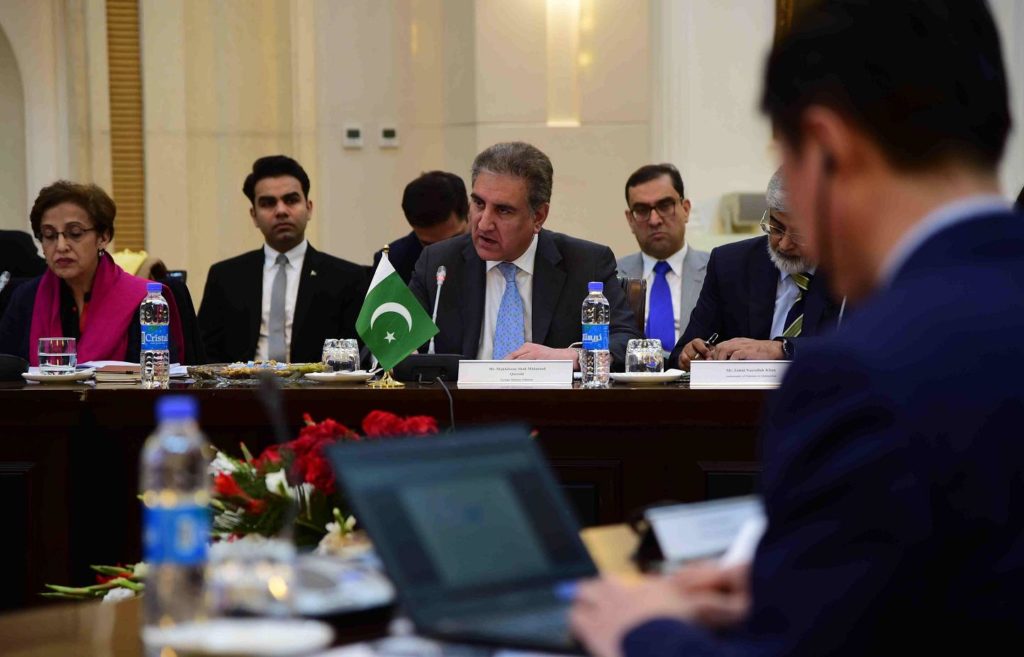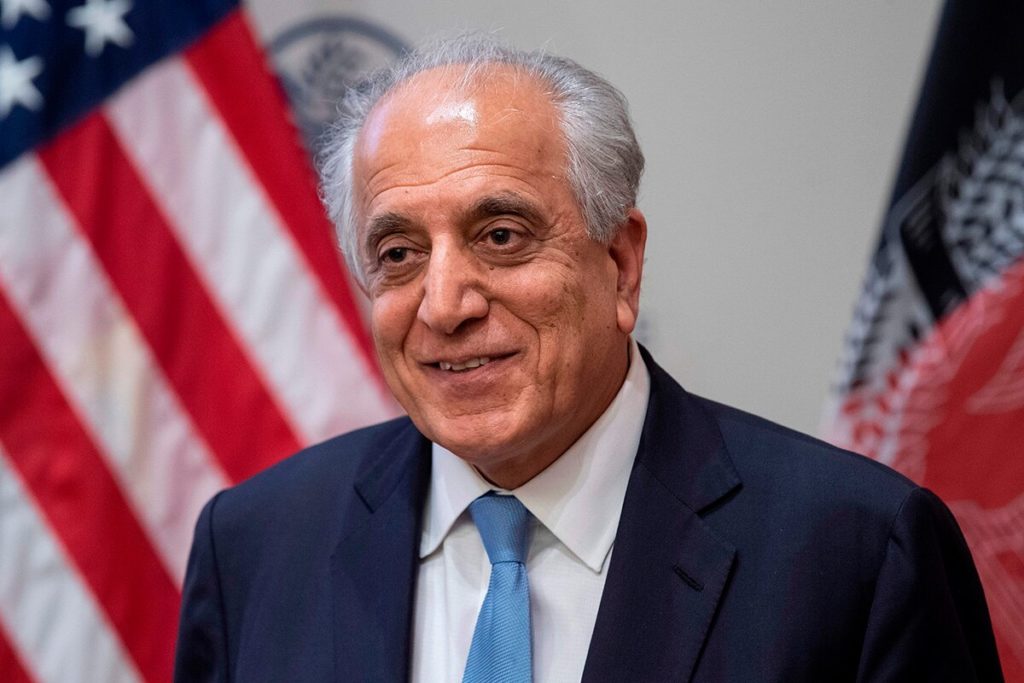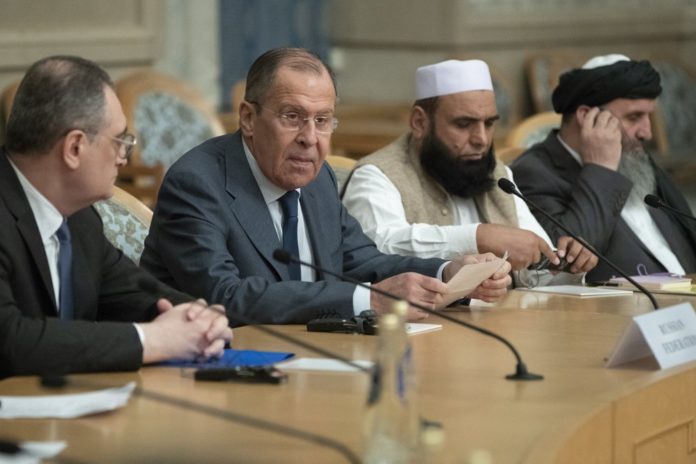Afghanistan rivals failed to reach a breakthrough on holding direct peace negotiations during international talks in Moscow, the latest international effort to end the conflict. Russia had invited representatives from the United States as well as India, Iran, China and Central Asian Republics; all hailed the Moscow Format Consultations on Afghanistan as an opportunity to “open a new page‟ in Afghanistan’s history and seek an end to the war 17 years after the US-led invasion. The Taliban are banned from operating in Russia as they are classified as a “terrorist organisation”.
The Moscow format meeting came at a sensitive time. Newly appointed US peace envoy Zalmay Khalilzad has been trying to convince the Taliban to agree to negotiate an end to the war and there were fears that the Russian meeting could derail those efforts. Russia hopes “through joint efforts to open a new page in the history of Afghanistan,” Russian Foreign Minister Sergei Lavrov said as the talks opened at a Moscow hotel. He said that the participation of both Afghan leaders and the Taliban was an “important contribution” aimed at creating “favourable conditions for the start of direct talks.” I am counting on you holding a serious and constructive conversation that will justify the hopes of the Afghan people, he said during the inaugural session.
The US participated at an observer level while India participated at an unofficial level. This is the first time that India attended any talks on Afghanistan in the presence of Taliban representatives. The US sent an observer delegation composed of staff from its Moscow embassy. The Afghan delegation was made up of four representatives of the High Peace Council, a government body responsible for reconciliation efforts with the militants, spokesman Sayed Ihsan Taheri said. The Afghan foreign ministry emphasized that the council did not represent the Afghan government at the meeting.
However, this was the first meeting of the Moscow Format with participation of Afghan High Peace Council representatives and Afghan Taliban delegation from its Qatar political office; both maintaining a state of semi-denial. During the meeting senior Taliban delegate Shahabuddin expressed the desire to talk to anybody anywhere in the world to end American occupation over Afghanistan. Pakistan views the Moscow Format meeting as a step towards lasting peace and stability in Afghanistan& one wonders how?
This is for the second time that Russia has attempted to bring regional powers together while seeking ways for establishing peace in war-torn Afghanistan. The first such meeting, proposed for September 4 of this year, was called off at the last moment after the Afghan government pulled out, describing its involvement in the Moscow meeting as “unnecessary” as the Taliban had “disrespected internationally-sanctioned principles and rejected the message of peace and direct negotiations”.
Over the previous years, Afghanistan has continued to become increasingly caught in the cross-hair of multiple peace initiatives through more than a dozen processes. Some of these are at cross-purposes to each other, while remaining are non-starters. These days two such process are hyper active: the US sponsored Doha peace process, with Alice Wells as its focal person, and the Russia sponsored Moscow Format Consultations on Afghanistan, under stewardship of the Russian President’s special envoy for Afghanistan, Zamir Kabulov.
The Americans keep blaming the Russians for arming the Taliban and Russians keep doubting the American intent to bring peace to Afghanistan. Yet another China- led peace process is moving slowly and steadily and is radiating hope of achieving some semblance of Afghan peace in distant future. Reportedly, a trilateral meeting of Pakistani, Chinese and Afghan Foreign Ministers is likely to be held soon in Kabul. However, key to peace continues to be with the US, as departure of American residual garrison is key Taliban demand.
According to an official US report, Afghan government has lost control over a record number of districts. The report identifies a dangerous trend which could have disastrous consequences for Afghanistan and its neighbours, particularly Pakistan. The US report highlights the increasing ungoverned spaces in Afghanistan. These are utilized as sanctuaries by terrorist elements which cross into adjacent countries for terrorist activities. There is an urgent need to curb these notorious elements. Pakistan has always raised its concerns regarding the worsening security situation in Afghanistan, as it is directly affected by this situation.
Violence in Afghanistan arising out of clashes between Taliban and the Afghan National Defence Forces and Foreign occupation forces combine is now an accepted norm. On November 08, militancy in Afghanistan’s central and eastern regions due to Taliban attacks left 13 policemen dead; and in a joint operation by Afghan and foreign forces in Dand-e-Ghori area of Baghlan province, sixteen Taliban were killed and nineteen others injured. The Taliban also attacked a police outpost in Khugyani district, Gazni, killing eight policemen, including a district commander.
Ambassador Alice Wells keeps visiting the region in an effort to close the gaps between various stakeholders, visiting Islamabad on November 6, 2018. According to a press release by the US Embassy in Pakistan, the US envoy arrived in Pakistan to review key items on the bilateral agenda between the two countries. She underscored the importance of all actors in the region takings steps to advance security, stability and cooperation in South Asia. She also welcomed the commitment from Pakistani officials to work towards this goal. The US envoy and Pakistani officials also discussed the upcoming Geneva Conference on Afghanistan and joint efforts to advance the Afghan peace process.
A day later, Pakistan and Afghanistan held the second meeting of the Refugee Working Group (WG) under the Afghanistan-Pakistan Action Plan for Peace and Stability (APAPPS). The meeting discussed matters related to Afghan refugees and other Afghan nationals illegally residing in Pakistan. Both sides deliberated on ways to enhance mutual cooperation for a dignified, gradual, time bound and complete return of the Afghan nationals to their country. It was also decided to observe the agreed timelines and procedures for repatriation of various categories of these persons to Afghanistan.
Pakistan has consistently supported and has remained part of all efforts aimed at providing an enabling environment to find a peaceful resolution to the Afghan issue. Platforms like the Moscow Consultation process, the Quadrilateral Coordination Group (QCG), the Heart of Asia & Istanbul Process, the SCO Contact group on Afghanistan, the Kabul process, and various trilateral processes such as the Pakistan-Afghanistan-China and Pakistan-Afghanistan-Turkey forums etc. are some notable examples in this regard. Pakistan has strongly and consistently underscored the need to give peace and reconciliation a fair chance in Afghanistan, through initiatives acceptable to Afghanistan.

This has helped in building a broader international consensus for making joint efforts for peace and reconciliation in Afghanistan. Pakistan has also kept reminding about the futility of wasting precious human, capital and material resources by following a kinetic or military intensive approach. These principles have now been accepted more or less universally as guidelines to end the Afghan conflict. Pakistan believes that there is no military solution available and only a political solution, fully cognizant of and responsive to the hard core socio-cultural, political and economic realities of Afghanistan can restore peace in the country.
Nonetheless it remains a difficult goal to achieve, because it demands flexibility from all sides, especially on the hardened positions and stances, and a willingness to negotiate without pre-conditions, so that new ideas and peace efforts could find greater space to emerge and steer the Afghan peace process.
Pakistan has been participating in the Moscow Format since its inception and has always maintained that the most viable solution to the conflict in Afghanistan is in an Afghan-led, Afghan-owned peace process. And that role of Afghanistan’s neighbours would be very important in such a process.
These talks advance Russia’s interests in Afghanistan in many ways. The talks demonstrate Russian potential to act as an effective mediator between the Taliban and Afghan government. Russia is using the Moscow format to increase the credibility of the Shanghai Cooperation Organization (SCO) & efforts to facilitate a political settlement in Afghanistan. During the last SCO summit in Qingdao, Chinese President Xi Jinping outlined his strategy to increase the role of the SCO-Afghanistan Contact Group in bringing about a peaceful solution to the Afghanistan conflict. Xi’s statement was positively received in Kabul. Afghanistan’s Chief Executive Abdullah Abdullah and President Ashraf Ghani who attended the SCO summit, had urged the SCO to consolidate its counterterrorism efforts in Afghanistan under one banner.
Taliban spokesman Zabihullah Mujahid had said in a statement prior to conference: “The meeting will discuss the end of American invasion, identify problems and deliberate on regional peace. This conference is not about negotiating with any particular side, rather it is a conference about holding comprehensive discussions on finding a peaceful solution to the Afghan quandary and ending the American occupation. The Taliban had last month appointed five former Guantanamo Bay detainees who had been swapped for US soldier Bowe Bergdahl in 2014, to its political office. They have the authorisation to talk about peace, a senior Taliban official told AFP.

Mullah Baradar, younger brother of legendry Mullah Umar was under custody for the last many years after his capture by the Pakistani authorities in a search operation. His release was facilitated by Pakistan at the US request in order to provide impetus to the peace and reconciliation efforts and move forward on a political settlement in Afghanistan. This decision was taken following the visit of the US Special Envoy on Afghan Reconciliation, Ambassador Khalilzad to the region and his meetings with Taliban representatives in Doha.
While in Kabul NATO chief Jens Stoltenberg said on November 06 that Afghanistan’s chances for peace were “greater now” than in many years, even as the Taliban step up attacks on Afghan forces, which are suffering record high casualties. A US government watchdog, Special Auditor General on Afghan Reconstruction recently stated that Kabul’s control of Afghanistan had slipped in recent months as local security forces suffered record casualties while making minimal or no progress against the Taliban. Stoltenberg’s remarks in Kabul came hours after the Taliban stormed a remote army post in the country’s west, which local officials said had killed at least 20 Afghan soldiers. Amidst escalating violence, Stoltenberg struck a relatively optimistic (read foolhardy) tone during his unannounced visit to the Afghan capital.
Most of the ongoing Afghan peace processes are nothing more than trash. Afghan peace is the biggest challenge of this century haunting the comity of nations. It needs a quality peace process under the UN auspices, underwritten by P-5 members of UNSC; and led by UNSG’s special envoy of the stature of late Kofi Annan.




